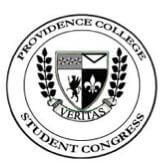by The Cowl Editor on December 7, 2017
Congress Updates
by Connor Nolan ‘19
Student Congress Publicity

Student Congress’s Executive Board would like to thank all of its members for a great semester and wishes good luck to all those leaving to study abroad.
The first piece of old business presented before the congress in this past Tuesday’s meeting regarded the formation of a Pre-Law Society on campus. The club was passed unanimously by the members in attendance. Congratulations to all who worked on it.
Another piece of old business also regarded the formation of a club on campus, Campus Cursive, also known as More Love Letters. The presenters of the piece reiterated some of the reasons the club came to be that were discussed in the previous week’s meeting. They urged all students to look into moreloveletters.com as well. There was no discussion to follow, and the club was passed unanimously by those in attendance. Congratulations to the members of the club and congress who worked on it.
The third piece of old business to be voted upon at this week’s meeting regarded the usage of a candidate information form by all those running for positions on congress. The presenter spoke to the piece’s merits, saying that this is a good step to getting students to know more about the people who they are voting for, especially for feshmen. Members of congress attested to this being a good idea and even spoke about how it could lead to greater voter turnout on campus. The piece was passed and will be implemented next election cycle.
An important piece of old business regarded the formation of an environmental biology major here at Providence College. The presenters emphasized that many other colleges have an environemntal biology major, as well as the support from PC science professors for the establishment of this major. They also declared that the deadline to declare the major would be the end of the fall semester junior year for current biology majors and spring semster sophomore year for non-science majors. The major was passed in a vote by all members of congress. Congratulations to all who worked hard for this as well as the academics committee.
The next piece of old business regarded the possible veto of mandatory events determined by the executive board of congress. The presenter of the piece, following heated discussion last week, decided to table the piece definitely.
Another piece of old business regarded the revote on an old piece of congress legislation that had fallen out of practice years ago. It spoke of the internal approval of committee appointments which are chosen by the executive board. Multiple questions followed including why this is necessary, why the speaker said it would be detrimental if it was not passed, how the process would exactly work, and why so much of why it was necessary was theoretically based. Following these questions and confusion, the presenter moved to have the piece tabled definitely as well.
The last piece of old business presented at the meeting included the formation of the SCITE committee to support change and inclusiveness on campus. This ad hoc committee (possibly instated on a temporary basis) would be a part of congress just as any other committee currently is. The presenters spoke at length about the need for this, including Congress’s need to be “bigger and more impactful in the community.” This “team” would also follow through on passed legislation to help implement it on campus. They made changes that were heavily debated last week, including removal of the phrases “protest” and “teach” from the legislation. Some clubs supported the idea of having a sort of “liaison” from congress, but others were less receptive. They were also questioned on whether they had reached out to the diversity and inclusion committee already on campus, and some wished they had done more to work with them instead of through congress. Some members of the congress also believed that this may lead to less active fighting for diversity and involvement in congress, as members could just claim the committee was doing it. All seemed to agree the congress should do more, but many seemed to think this was not the best way. Some race-based conversations followed, with all members of congress remaining cordial. and calm, leading to vital and necessary discussion. The presenters reiterated that this committee was not made to do away with or hurt other clubs, it was instead to address a problem seen both within congress and on campus. A vote was called, but the piece did not pass.